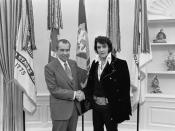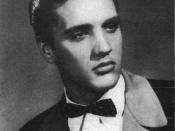Before evaluating the effect pop culture has on society, it is first necessary to examine whether there is an actual effect at all. Many people argue that 20th century technology such as television "dumbs down" society and encourages uniformity, but this may be a misrepresentation. Leveling implies the population becomes the same or close to it, which has never been true in American society. There have always been distinct differences between generations, and these generations have traditionally had very different views on "low" and "high" art. Music from artists such as Elvis Presley and the Beatles, now lauded by many, was at one time considered the lowest form of art by all but a few.
Those who believe in low and high art tend to place too much emphasis on the importance of the classics, and too often reject contemporary artists. However, these 'masters' were once contemporary artists themselves, and perhaps not so "high" as one might think.
British novelist Charles Dickens wrote mainly pulp fiction for magazines and newspapers, and was paid by the word. What some call Dickens' 'description,' others call 'rambling.' Johann Sebastian Bach, who composed without question the highest art known, wrote much of his music on commission for churches and nobility. These one-time-use pieces could simply have been thrown away after the ceremony at which they were played, but now are revered as masterpieces. Even Antonio Vivaldi has been said not to have composed over 600 pieces, but to have composed the same piece over 600 times. What was considered pop culture in the past is the present's "high" art.
However, there is still a case for differentiating between low and high art. Television and movies are typically viewed as "low" art, while "high" art tends to include painting music, and poetry. But often, these...


